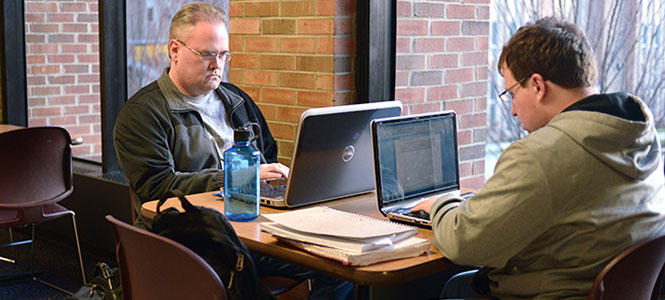Nontraditional students’ experiences stray from norm
Kent State senior chemistry major Matthew Davis sits with senior Justin Robinson on the second floor of the student center. Davis is one of many nontraditional students attending Kent State. “I tried going to college after high school, but I wasn’t ready,” Davis said. Photo by Melanie Nesteruk.
November 25, 2013
A man in a gray suit and matching flat cap steps on a Campus Loop PARTA bus at C-Midway, walks about halfway down the aisle and sits at a window seat.
The bus starts, and the man pulls out a red book and reads it, occasionally glancing out the opposite window. The bus stops near Tri-Towers, and the man stands up, walks down the aisle and steps off the bus.
At 44, Scott Barth is one of several nontraditional students on Kent State’s campus. Barth said he brings a unique perspective to college.
Barth has lived around the country and worked in corrections and drug rehabs. He received a bachelor’s degree in general studies from Kent State in 2000 and returned for a master’s in public health.
To enter school at the age of 25 or older is one qualification to be considered a nontraditional student in the United States, according to The National Center for Education Statistics.
The concept of nontraditional students is a U.S. phenomenon, Barth said.
“A lot of parts of the world have people that are lifelong learners, and I think it’s an anomaly in America that you get your four-year degree to get a good job — and then what? You stop learning?” Barth said.
Barth said he didn’t return to college only to improve his financial situation but because he enjoys learning. To attend college for the sole purpose of making money ties in with the unnecessary profit motives of corporate America, he said.
“Corporations have way too much power in this country — way too much power — and it’s the cusp of fascism,” Barth said. “So yeah, I’m a nontraditional student.”
Halfway across campus, Carrie White sits in her quiet office in the Ohio Literacy Resource Center. Her work concerns helping another type of nontraditional student.
White is director of the GED Scholars Initiative, which gives academic, financial and social support to Kent State students and prospective students who received GEDs. According to NCES, college students with GEDs are considered nontraditional students.
“There are different faces of people who have earned their GEDs for many different reasons,” White said. Among those reasons are health concerns and having children, she said.
Senior special education major Sasha Wilson said she left high school to provide money to her family through her job at the Ravenna Parks and Recreation Department.
Wilson earned her GED in September 2009. She originally met with the GED Scholars Initiative because it provided her with food, but it gave her more information about college, and she realized she might be able to attend.
In 2010, without the help of loans but with grants and scholarships, she enrolled in and moved to Kent State.
College hasn’t been easy for Wilson. She said in a 7:45 a.m. math class freshman year her professor commented to the class that they should remember material from high school the year before, but she wasn’t in high school the year before.
Another time, Wilson said, a classmate told her she wasn’t as smart as other students because she received a GED instead of a high-school diploma.
“We’re still at the same level as other students,” she said of GED earners.
Wilson currently tutors for the GED Scholars Initiative and plans to study abroad in Germany in the spring.
However, criticism among nontraditional students is not limited to GED earners.
Senior early childhood education major Kelly Farmer, 35, said a classmate recently made a comment to her about her age.
“Somebody had just said ‘I was 4 when you graduated,’ and that made me feel really old, and, honestly, that was the first time I ever felt different from them,” Farmer said.
She said her previous life experiences have helped her in college. Being a parent of a son and daughter, now 10 and 8 years old, respectively, has provided insight into her work as a student teacher at the Child Development Center.
“It’s a benefit for me to have had my own children and know how the children develop and what the children might be going through as early as 18 months,” she said. “If somebody’s having a cranky day, they might not be sick, they might be teething, and somebody who has not been a mother before might not realize that.”
Not only has Farmer’s parenting helped her in college, but she said college has helped her parenting.
“For me, my children see me work on homework every night just like they’re working on homework, and it’s a great lesson for my children to see me go through and do everything and go to college, and it puts the importance of college in our family,” she said.
Contact Patrick Williams at [email protected].












